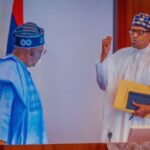The Peoples Redemption Party (PRP) has criticised the economic policies being implemented by President Bola Tinubu, labeling them as unrealistic and harmful to the Nigerian populace.
The party expressed dismay at what it perceives as a disconnect between the government’s policies and the hardships faced by ordinary citizens.
In a statement signed by the national chairman of the PRP, Dr. Falalu Bello, the oldest opposition party in the country said the current administration appears either oblivious to the plight of the common man or is adhering to external economic models that historically fail to uplift nations.
The party cited examples from past decades where similar policies endorsed by international financial institutions like IMF and the World Bank led to economic stagnation rather than progress, in Africa and Latin America.
“The recent increases in taxes and interest rates under these policies defy logic, especially amidst reports of widespread business closures, including major multinational companies,” PRP stated.
The party decried the adverse effects of fuel subsidy removal, naira devaluation, rising electricity tariffs, and hyperinflation which have exacerbated the challenges faced by Nigerian manufacturers.
PRP contended that viable alternatives exist within the field of economics that could offer more equitable solutions. They called for an immediate reconsideration of policies perceived as detrimental to the masses, urging the government to prioritise the well-being of its citizens.
Commenting on the issue of the National Minimum Wage, PRP ridiculed the government’s stance, describing it as out of touch with reality.
It also criticised the delay in adjusting workers’ wages despite an increase in government revenue and pointed out discrepancies in salary adjustments across different branches of government.
“Increasing parliamentary and judicial salaries significantly while neglecting the minimum wage issue is unjustifiable,” PRP asserted.
The party, therefore, urged President Tinubu to demonstrate empathy and fairness by addressing the urgent economic concerns of the Nigerian workforce and citizens.

 Join Daily Trust WhatsApp Community For Quick Access To News and Happenings Around You.
Join Daily Trust WhatsApp Community For Quick Access To News and Happenings Around You.


